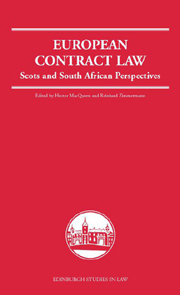Book contents
- Frontmatter
- Contents
- Preface
- List of Contributors
- List of Abbreviations
- 1 Ius Commune and the Principles of European Contract Law: Contemporary Renewal of an Old Idea
- 2 Good Faith
- 3 Offer, Acceptance, and the Moment of Contract Formation
- 4 The Battle of Forms
- 5 Agency
- 6 Threats and Excessive Benefits or Unfair Advantage
- 7 Interpretation
- 8 Third-Party Contracts
- 9 Payment
- 10 Specific Performance and Special Damages
- 11 Termination for Breach of Contract
- 12 Assignment
- 13 Capitalisation of Interest
- Appendix: The Principles of European Contract Law
- List of Cases
- Index
10 - Specific Performance and Special Damages
Published online by Cambridge University Press: 05 July 2013
- Frontmatter
- Contents
- Preface
- List of Contributors
- List of Abbreviations
- 1 Ius Commune and the Principles of European Contract Law: Contemporary Renewal of an Old Idea
- 2 Good Faith
- 3 Offer, Acceptance, and the Moment of Contract Formation
- 4 The Battle of Forms
- 5 Agency
- 6 Threats and Excessive Benefits or Unfair Advantage
- 7 Interpretation
- 8 Third-Party Contracts
- 9 Payment
- 10 Specific Performance and Special Damages
- 11 Termination for Breach of Contract
- 12 Assignment
- 13 Capitalisation of Interest
- Appendix: The Principles of European Contract Law
- List of Cases
- Index
Summary
INTRODUCTION
The interplay and differences between Common Law and Civil Law in mixed legal systems are illustrated very clearly in two remedies commonly available after a breach of contract, namely specific performance, or specific implement, and the rules relating to special damages. Specific performance provides an instance where the Civil Law and the Common Law depart from directly opposing points of view. In Civil Law specific performance is regarded as the natural remedy after breach, whereas in Common Law it is regarded as exceptional, with damages being the prime remedy.
The rules on special damages, on the other hand, provide an instance where there is a large measure of convergence between Common Law and Civil Law, due to the pervasive influence of Pothier in this field. The comparison of these two remedies of South African and Scots law provides an interesting backdrop for a consideration of the relevant provisions of PECL.
SPECIFIC PERFORMANCE
Introduction
The issue of specific performance seems to draw a very definite dividing line between the Common Law and Civil Law traditions. During the drafting process for CISG the question of specific performance presented an obstacle on which no consensus could be reached. It resulted in a compromise which preserved the autonomy of the lex fori to apply its own specific rules.
- Type
- Chapter
- Information
- European Contract LawScots and South African Perspectives, pp. 249 - 279Publisher: Edinburgh University PressPrint publication year: 2006

